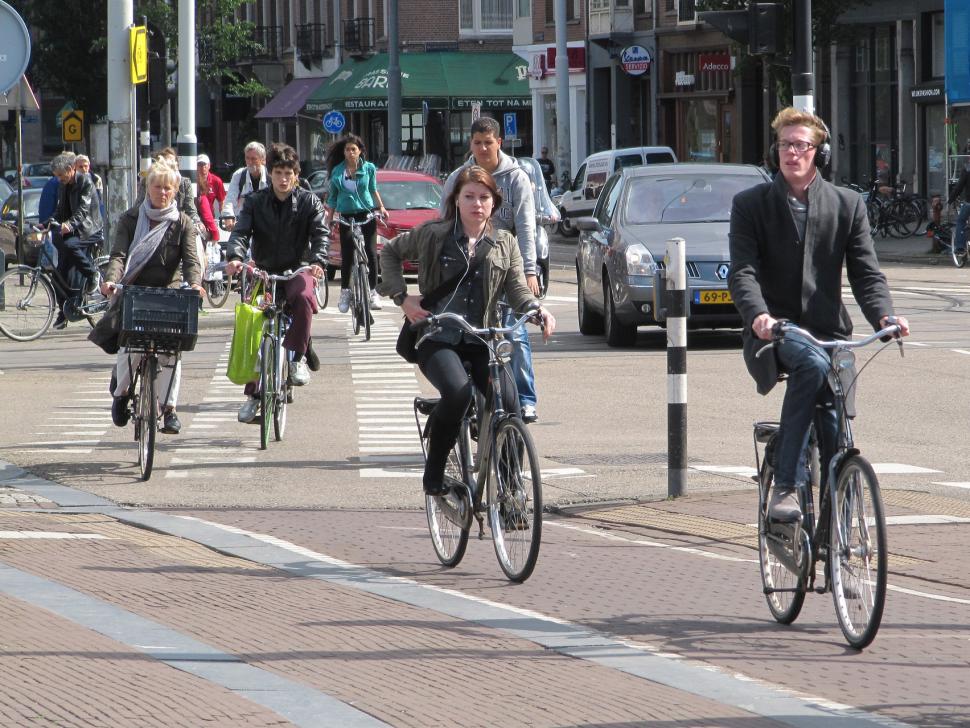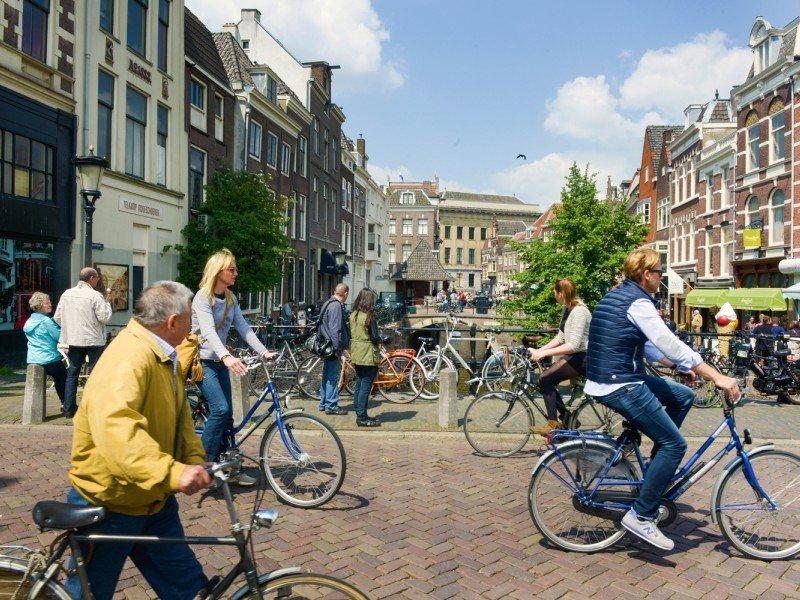- News
- Reviews
- Bikes
- Accessories
- Accessories - misc
- Computer mounts
- Bags
- Bar ends
- Bike bags & cases
- Bottle cages
- Bottles
- Cameras
- Car racks
- Child seats
- Computers
- Glasses
- GPS units
- Helmets
- Lights - front
- Lights - rear
- Lights - sets
- Locks
- Mirrors
- Mudguards
- Racks
- Pumps & CO2 inflators
- Puncture kits
- Reflectives
- Smart watches
- Stands and racks
- Trailers
- Clothing
- Components
- Bar tape & grips
- Bottom brackets
- Brake & gear cables
- Brake & STI levers
- Brake pads & spares
- Brakes
- Cassettes & freewheels
- Chains
- Chainsets & chainrings
- Derailleurs - front
- Derailleurs - rear
- Forks
- Gear levers & shifters
- Groupsets
- Handlebars & extensions
- Headsets
- Hubs
- Inner tubes
- Pedals
- Quick releases & skewers
- Saddles
- Seatposts
- Stems
- Wheels
- Tyres
- Health, fitness and nutrition
- Tools and workshop
- Miscellaneous
- Tubeless valves
- Buyers Guides
- Features
- Forum
- Recommends
- Podcast
news
 Better facilities, like these in the Netherlands, woiuld encourage people to cycle more (CC BY-NC-SA 2.0 licenced by MarkA:Flickr)
Better facilities, like these in the Netherlands, woiuld encourage people to cycle more (CC BY-NC-SA 2.0 licenced by MarkA:Flickr)Dutch government and neurologists call on cyclists to wear helmets – but cyclists’ union says “too much emphasis” on helmets discourages cycling and “has an air of victim blaming”
The Dutch Cyclists’ Union has admitted that it may be a “wise decision” to wear a bike helmet on a voluntary basis, but urged against placing too much emphasis on helmet use – which the group argued can actually discourage cycling and instil a victim blaming culture in the famously cycling-friendly nation – after local authorities, the government, and neurologists urged people in the Netherlands to don a helmet when travelling around by bike.
Next month, the Netherlands’ transport ministry will introduce new guidelines on voluntary helmet use, after provinces such as Utrecht ran a campaign in May offering a €25 discount on helmet purchases.
Gelderland, meanwhile, is currently in the midst of its own campaign which attempts to raise awareness of helmet use and promote “behaviour change” in elderly cyclists, with people over 60 accounting for almost half of all seriously injured cyclists in the Netherlands.
> Dutch surgeons call on people to wear helmets while cycling
In a country with a distinct, deeply embedded cycling culture and where 28 per cent of all journeys are made by bike, only 3.5 per cent of Dutch cyclists wear helmets, which are usually confined to the nation’s sport or leisure cyclists.
However, calls for the Netherlands’ fietsers, its everyday cyclists, to wear helmets while out and about have been increasing in volume in recent years, as the number of cyclists seriously injured each year has risen by 27 per cent over the past decade, according to injury prevention organisation Veiligheid NL.
The Dutch Institute for Road Safety Research has also claimed that if all Dutch cyclists wore helmets, fatalities on the road would drop by 85 each year, and the number of serious injuries reduced by 2,500.
In 2022, 88,000 cyclists were injured in the Netherlands, making up 66 per cent of all casualties on the road. Around half of those collisions involved a motorist.
> Cyclists wearing helmets seen as "less human" than those without, researchers find
In light of these figures, two of the Netherlands’ leading road safety researchers, Fred Wegman and Paul Schepers, questioned whether the country could truly be said to support Vision Zero and similar initiatives without addressing the problem of head injuries suffered by cyclists not wearing helmets – even calling on the Netherlands to potentially follow Australia’s lead by introducing an obligatory helmet law.
“Modifications to cars can reduce injury in a collision, but in single-bicycle crashes, a helmet is one of the few possible measures to prevent serious head injuries,” Wegman and Schepers said.
“In case of a fall or crash, the use of a bicycle helmet was found to reduce serious head/brain injury by 60 per cent and fatal head/brain injury by 71 per cent on average, while it is found that the protective effect is the same for children and adults.
“In summary, wearing a helmet while cycling reduces the risk of head and brain injuries, and this reduction is higher for more severe injuries. A helmet obligation could be more effective than encouraging voluntary wearing.
“Perhaps the latter may be needed to increase support in the Dutch society for an obligation. Helmet use by cyclists seems to be a very relevant contribution towards zero cycle casualties in the Netherlands.”
> Why is Dan Walker’s claim that a bike helmet saved his life so controversial?
Meanwhile, a number of medical experts have also called for more frequent use of helmets, with Evert Pronk, the deputy editor of the Medical Contact journal, declaring his support for the campaign by admonishing those who purportedly refuse to wear helmets “because they don’t look good” in an article that featured the headline: “Looks good on you, a skull fracture”.
“I’m a huge fan of cycling but it’s important to protect ourselves,” neurologist Myrthe Boss, whose mother died after being hit by a motorist on a roundabout while cycling in 2019, told the Guardian this week.
“The brain is a very vulnerable organ with limited capacity to recover. If you fall from a bike and sustain a brain injury, this has long-term consequences. And a large proportion of people who fall while cycling have brain injury.
“A helmet doesn’t prevent everything but it does ensure there is less impact from the street on your head,” Boss said. “You see what it does in your family when you lose someone that way.”
Responding to the increasing calls for helmet use, the Dutch Cyclists’ Union, Fietsersbond, admitted that helmet use has its benefits – but warned against placing too much emphasis on one aspect of bike safety.
“We have the position that helmets don’t prevent accidents but it can be a wise decision to wear one on a voluntary basis,” the union’s director, Esther van Garderen, said.
“Emphasising too much that you should wear a helmet would discourage people from cycling sometimes, though, and has the air of victim blaming.
“I think it’s coming slowly, although there’s no such thing as a society with zero danger and we value our culture where you can cycle safe and free.”
Back in the UK, meanwhile, the bike helmet debate once again made national headlines, after celebrity chef Gordon Ramsay said his helmet meant he was “lucky to be standing here” after crashing heavily while cycling in Connecticut.
“Honestly, you’ve got to wear a helmet,” Ramsay said in an Instagram video in which he showed off the severe bruising to his side caused by the crash.
“I don’t care how short the journey is, I don’t care the fact that these helmets cost money, but they’re crucial. Even with the kids, [on] a short journey, they’ve got to wear a helmet.
“Now I’m lucky to be standing here. I’m in pain, it’s been a brutal week. I’m sort of getting through but I cannot tell you the importance of wearing a helmet. Please, please, please, please wear a helmet – because if I didn’t, I wouldn’t be here now.”
After obtaining a PhD, lecturing, and hosting a history podcast at Queen’s University Belfast, Ryan joined road.cc in December 2021 and since then has kept the site’s readers and listeners informed and enthralled (well at least occasionally) on news, the live blog, and the road.cc Podcast. After boarding a wrong bus at the world championships and ruining a good pair of jeans at the cyclocross, he now serves as road.cc’s senior news writer. Before his foray into cycling journalism, he wallowed in the equally pitiless world of academia, where he wrote a book about Victorian politics and droned on about cycling and bikes to classes of bored students (while taking every chance he could get to talk about cycling in print or on the radio). He can be found riding his bike very slowly around the narrow, scenic country lanes of Co. Down.
Latest Comments
- chrisonabike 10 min 4 sec ago
(sticking to Christian examples for fear of being smitten)....
- leedorney 13 min 50 sec ago
This guy needs to give up driving - if you aren't able to yield to anything on the road and operate a vehicle with due care and attention, you may...
- imajez 16 min 24 sec ago
You must have very low expectations then. Following the route on my 1040 is harder than my antique original Wahoo Elmnt from 2017. Even after...
- kingleo 29 min 26 sec ago
I built up an old classic type general purpose bike so I could leave it outside the shops and nobody would steal it - so what happened? lots of...
- Mrazi 39 min 39 sec ago
Rijfussell! As in my coutry used to say: you hit the nail on the head!
- Bill H 1 hour 13 sec ago
Hackney council has seemingly always hated its residents, especially those who are not dependent on the council for their living, accommodation or...
- quiff 57 min 8 sec ago
I believe the CHPT3 name was intended to acknowledge, albeit indirectly, the cheating. As in, it was the third chapter of his life after the...
- bikeman01 1 hour 6 min ago
3rd party liability is easily ticked off by joining Cycling UK or British Cycling....
- hawkinspeter 1 hour 34 min ago
If there's Nazis on the platform and they're not being removed, then it's a Nazi platform....
- hawkinspeter 1 hour 39 min ago
"who hasn’t keenly fingered a jar of peanut butter at the end of a hard ride?"



Add new comment
192 comments
I would point out that this thread is about "a helmet saved my life"...
But to address your point, if bike helmets decreased relevant head injuries somewhat, there'd necessarily have to be some at the more grievous end of the scale that would have been fatal without one, and that should show up in the y-percentages and thus the x. It doesn't seem to do so...
As concernes your bracketed argument: it was advanced by Rendel and dh700 addressed it. This mysterious force cancelling out the benefits of helmets would have to have been exactly as great as the latter, and for decades by now, otherwise it would show up in the statistics.... I'd apply Occam's razor to that likelyhood.
Not my point - Rendel's. And I'm not convinced it does address it, because I still think you're arguing about different things. Which is a bit pointless.
So let's assume one of these hypotheses is correct, just for argument's sake.
The end result is that bicycle helmets do not save lives. That is where the rubber meets the road. And that's the entire point. They do not work as-claimed by their fans. They do not exhibit a positive safety signal, statistically. It is not essential that we understand why they do not work in order to state the plainly-obvious fact that they do not work. Similarly, we do not need to understand how clouds form in order to state that it is raining out.
All that said, we have a very good idea about why they do not work. 250 grams of plastic and styrofoam is simply insufficent for the task at-hand. Even 2 kg motorcycle helmets struggle to demonstrate a positive safety benefit, despite vastly superior construction.
None of this ought to be news, to anyone who has been paying attention.
Pretty sure that's not where the helmet's meant to go.
But it is a very interesting stat.
Personally I choose to wear a helmet for road riding, but before "the state" chooses to start leaning on cyclists to always wear one, I'd be very interested in seeing some meaningful statistics around head injury fatality rates before and after the introduction of compulsory helmet wearing in relevant countries.
Many years ago now, but there was a study in Australia which found that counterintuitively, accident rates INCREASED when riders wore helmets, due to behavioural changes, mainly in DRIVERS.
I haven't read the report for many years but there are so many factors involved in helmet use or nonuse that I suspect its very difficult to design a study that would come to an authoritative conclusion about the impact on driver behaviour of expanding helmet use in relation to cyclist injury risk.
Australia;
Head injuries + rate went down at the same rate they had been going down for decades (despite a drastic increase in helmet wearing).
NZ - head injuries went down, but rate (i.e. head injuries per hour/mile cycled) went UP; I.e. they just scared enough cyclists off the road to reduce cycling head injuries.
Jersey - head injuries remained the same for mandated group; They can't go down - there had been 0 recorded head injuries cycling on the island before they made helmets mandatory for under 16s (IIRC, might have been 14)...
There are probably other examples; IIRC the most important is arguably Australia, because a lot of other places have low/no enforcement; So mandating helmets makes no difference because without enforcement helmet usage doesn't actually change...
boo-hoo for your hair-do, I dont care
as society will have to somehow provide for/care for/ make allowances for victims of head injuries society does have the right to mandate helmet use. it's the same thing with seatbelt requirements for passengers in cars- seatbelts saves lives.
Stab vests save lives to, so I hope you wear one whilst walking anywhere as otherwise you're just putting a burden on society caring for your knife injuries.
It's interesting that you compare bike helmets with car seatbelts. Car seatbelts are specifically designed for most vehicle collisions whereas bike helmets are not at all designed for multi-vehicle collisions - they're tested for people coming off at up to 12mph and impact with a car (the most common kind of traffic incident) will be so far in excess of their design that it's not even funny.
There are some shocking trends in car design that have so much more an impact on the harm done to pedestrians and cyclists in collisions than the small increase in helmet use that might claimed by moving to compulsion.
?
Is this Taylor Swift or something?
Except that any remedy should be proportional to the social social cost it's supposed to address. Which it wouldn't even remotely be.
Better off just banning cycling - otherwise people will be quibbling about cost-benefit analysis!
The costs we pay that other people incur are reasonable to debate. That quickly becomes a can of worms with implications everywhere though. Just a taste - how should we price exercise? Do people get credit for keeping themselves fitter, even if sometimes that activity is associated with occasional more-severe injuries? Should those doing so pay for those injury costs? Or only if they don't follow some mandated (by whom?) "best practice"?
Mentioning seatbelts - d'you think society should remove the mandate to drive? Given that drivers cause a great deal of death and injury to themselves, never mind others?
Perhaps that's objectionable - so what about only those drivers who've had a crash?
Or maybe drivers (or cyclists, or pedestrians) who knock over people and fail to "end them rightly" should pick up the costs for their subsequent care?
Seatbelts - someone has done the cost-benefit analysis showing that they reduce the hospital costs associated with crash victims. Presumably you also have the figures for the total costs at a population level (e.g. those who then need further care, and whether the cost of that outweighs the tax loss etc. had they simply died)? You'll then want the same for helmets. If you don't I suggest you consult eburtthebike of this parish although I think his views differ from yours...
It's blindingly obvious that you haven't read much (if anything) on this topic. Good luck with stopping 2 tonnes of metal at 30 mph with half an inch of polystyrene.
If society cares (I think you mean pays) for victims* then it should first look at the causes of most harm. Since the drivers of motorised vehicles cause 1,700 deaths and over 200,000 injuries every year we could definitely make some improvements there. The nationwide 20 mph limits in urban areas in Wales introduced in September 2023 are already having a positive impact.
We could look at what other things cause large numbers of deaths and injuries. 100,000 people have strokes / TIA each year, for example. Each year, 1.4 million people attend A&E in England and Wales with a head injury and 200,000 are admitted to hospital as a result. [NICE]
I can assure you that cyclists' injuries caused by not wearing a helmet will be a loooong way down the list while the health benefits of physical activity associated with cycling were 21 times higher than the risk of injuries. [BMJ] [CUK]
But I am willing to bet that you don't actually care about people. Like so many ignorant jerks, you just want to punish people for cycling by forcing them to wear an ineffective hat.
* it's often insurance companies that pay out £millions for victims' life-changing injuries and this is a big factor in the price of car insurance, though this doesn't mean that there is no burden on the NHS, social care and other services.
Clearly a helmet is of no benefit when a Range Rover rolls over the top of you, but it may make a critical difference if you go over the bonnet and your head impacts the car in doing so, or you are knocked into street furniture. You don't loose the health benefits of cycling, climbing , horse riding, kayaking etc when you wear some protective head gear. Rock climbing has moved from hard hat protection to that more akin to cycle helmets because they offer better protection in falls.
Are you sure? And should I ride into town expecting that to happen? Should I wear knee and elbow pads too?
Pedalling a bike to school / work / shops / library / hairdresser shouldn't be made to appear as risky as kayaking down rapids between rocks, riding a singletrack descent or in a fast chain gang.
It has been shown before that mandating helmets by law is counterproductive, as others have indicated. But you're not interested in that, you just want everyone to do what you think is 'right' or 'obvious' regardless of the opposing arguments.
society spends a lot more resources on head injuries to car occupants and pedestrians, so them first.
Love to see comparative data for that claim. Talking per capita, similar speeds etc. falling out of the sky in a plane would be much more lethal than falling off a bike but the argument to focus on giving passengers on a plane helmets first is just as stupid as for drivers. Helmets stand a much greater chance of saving a cyclist than a driver due to speed and the limitations of a helmet. Totally ridiculous analogy.
I'm talking about total number of injuries treated p.a at a population level, since we are talking about the drain on society. If you wanted the maximum reduction in A&E head injury admissions, go for vehicle occupants. More people would be forced to wear helmets, sure, but the saving to society will be huge.
Meanwhile if you mandate helmets for cyclists and 30% of cyclists stop cycling in response, then the health costs will go up as cyclists are far less likely to suffer from obesity, heart disease, diabetes and even cancer than the general population. So if you want to save NHS money, getting people out of cars and onto bikes is the way to go, mandating helmets which gets people of og bikes and into cars has the opposite effect is not.
So you haven't seen the stats for people in cars who suffer head injuries?
Maybe you'd like to visit the 2 young men I know who had near-fatal car crashes due to excess speed, both suffering significant brain damage? Both were in their early 20s (one as a passenger), neither will ever walk or speak properly. They required significant hospital & rehab time and both will continue to live in adapted homes and have carers.
Helmets could offer a significant improvement in reducing the severity of head injuries in severe car crashes, particularly in vehicles without curtain airbags. But much like some cyclists the enforcement of head protection would be an imposition too far for many drivers.
In an ironic twist, requiring motor vehicle occupants to wear helmets would save more cyclist lives than requiring cyclists to do so.
The former would so drastically reduce motor vehicle traffic (if enforced) that cyclists and pedestrians would enjoy tremendous additional open space, and their encounters with motor vehicles would be decimated.
Depends;
Off road riding sure; The issue is falls.
For road riding the main risk is car collisions. So the motorist gets a head injury AFTER crumple zones in the car, padding and air bags have removed a lot of the energy; The cyclist has JUST a helmet to deal with said energy.
So if anything one would expect head protection (n.b. helmets for driving need to be designed to interact with seat head rests etc; IIRC a long time ago an Australian uni did the research and worked out a padded sweat band was as effective as a full helmet) to be more effective for drivers - because they are killed after a huge chunk of energy has been removed...
Of course the only real way to know would be to make a few 1000 people wear head protection while driving and see what happens...
Those motor sport governing bodies would seem to disagree with you.
And if it saves one life...
Laz-y!
So you're all about costs to society being born by those that cause them? How about then motorists bear the enormous costs their transport choices inflict on society, before we talk about cycle helmets?
Seatbelt laws were necessary because there was a very low compliance with advise to wear seatbelts prior to compulsion and the benefits in terms of reductions in serious and fatal injury rates were very substantial. In the UK at least helmet wearing amongst cyclists is already substantial and well established and the benefit likely to be very much smaller or even negative if it results in people jumping in the car to make short journeys.
Society also has to care for people with inactivity related illnesses;
Which is a lot more expensive than treating the occasional cyclist with a head injury.
Especially given cycle helmets prevent the need to clean cuts. Thats about all they are designed for; concussion and TBI are generally caused by impacts so far beyond helmet spec as to render helmets irrelevent.
Helmet wearing encourages worse over takes - personal experience of riding with and without.
nah it doesnt- it's your choice.
Pages